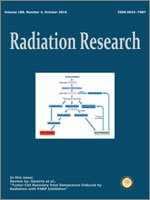Radiation-induced brain injury (RIBI) is the most common adverse effect that occurs after cranial radiation therapy (CRT). We have previously reported that CRT-induced release of pro-inflammatory cytokines in brain tissues and inhibition of neurogenesis in the hippocampus might be caused by microglial activation and may play an important role in RIBI. In this study we examined the role of p53-induced protein with a death domain (PIDD) in radiation-induced activation of BV-2 cells. BV-2 cells were transfected with antisense oligonucleotide control mRNA or antisense oligonucleotide-targeted PIDD mRNA and were sham or 16 Gy irradiated. The state of microglia and expression of pro-inflammatory cytokines were detected using real-time polymerase chain reaction, Western blotting, immunofluorescence and flow cytometry. Findings from this study suggest that silencing PIDD expression could inhibit microglial activation by downregulating the PIDD-C/NF-κβ transcription pathway. PIDD acts as a critical switcher between the NF-κβ transcription pathway and radiation-induced apoptosis. Given these findings, this study offers a potential novel approach to further combination treatment of RIBI.
How to translate text using browser tools
19 September 2016
PIDD Mediates Radiation-Induced Microglia Activation
Nong Yang,
Xican Gao,
Xiaofei Qu,
Ruiguang Zhang,
Fan Tong,
Qian Cai,
Jihua Dong,
Yu Hu,
Gang Wu,
Xiaorong Dong
ACCESS THE FULL ARTICLE

Radiation Research
Vol. 186 • No. 4
October 2016
Vol. 186 • No. 4
October 2016




